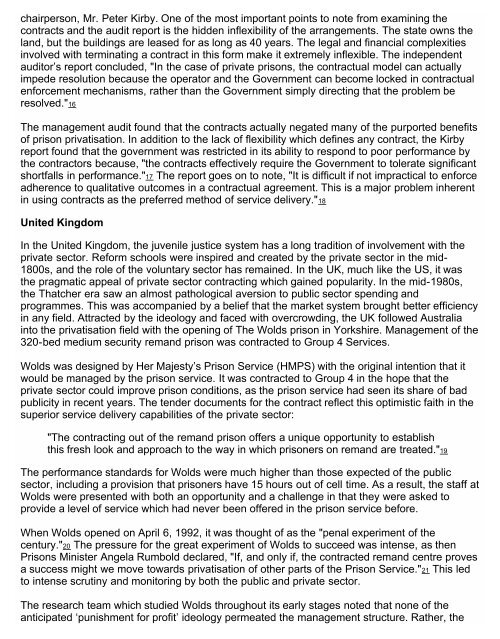prison privatisation in south africa issues, challenges and ...
prison privatisation in south africa issues, challenges and ...
prison privatisation in south africa issues, challenges and ...
Create successful ePaper yourself
Turn your PDF publications into a flip-book with our unique Google optimized e-Paper software.
chairperson, Mr. Peter Kirby. One of the most important po<strong>in</strong>ts to note from exam<strong>in</strong><strong>in</strong>g the<br />
contracts <strong>and</strong> the audit report is the hidden <strong>in</strong>flexibility of the arrangements. The state owns the<br />
l<strong>and</strong>, but the build<strong>in</strong>gs are leased for as long as 40 years. The legal <strong>and</strong> f<strong>in</strong>ancial complexities<br />
<strong>in</strong>volved with term<strong>in</strong>at<strong>in</strong>g a contract <strong>in</strong> this form make it extremely <strong>in</strong>flexible. The <strong>in</strong>dependent<br />
auditor’s report concluded, "In the case of private <strong>prison</strong>s, the contractual model can actually<br />
impede resolution because the operator <strong>and</strong> the Government can become locked <strong>in</strong> contractual<br />
enforcement mechanisms, rather than the Government simply direct<strong>in</strong>g that the problem be<br />
resolved."16<br />
The management audit found that the contracts actually negated many of the purported benefits<br />
of <strong>prison</strong> <strong>privatisation</strong>. In addition to the lack of flexibility which def<strong>in</strong>es any contract, the Kirby<br />
report found that the government was restricted <strong>in</strong> its ability to respond to poor performance by<br />
the contractors because, "the contracts effectively require the Government to tolerate significant<br />
shortfalls <strong>in</strong> performance."17 The report goes on to note, "It is difficult if not impractical to enforce<br />
adherence to qualitative outcomes <strong>in</strong> a contractual agreement. This is a major problem <strong>in</strong>herent<br />
<strong>in</strong> us<strong>in</strong>g contracts as the preferred method of service delivery."18<br />
United K<strong>in</strong>gdom<br />
In the United K<strong>in</strong>gdom, the juvenile justice system has a long tradition of <strong>in</strong>volvement with the<br />
private sector. Reform schools were <strong>in</strong>spired <strong>and</strong> created by the private sector <strong>in</strong> the mid-<br />
1800s, <strong>and</strong> the role of the voluntary sector has rema<strong>in</strong>ed. In the UK, much like the US, it was<br />
the pragmatic appeal of private sector contract<strong>in</strong>g which ga<strong>in</strong>ed popularity. In the mid-1980s,<br />
the Thatcher era saw an almost pathological aversion to public sector spend<strong>in</strong>g <strong>and</strong><br />
programmes. This was accompanied by a belief that the market system brought better efficiency<br />
<strong>in</strong> any field. Attracted by the ideology <strong>and</strong> faced with overcrowd<strong>in</strong>g, the UK followed Australia<br />
<strong>in</strong>to the <strong>privatisation</strong> field with the open<strong>in</strong>g of The Wolds <strong>prison</strong> <strong>in</strong> Yorkshire. Management of the<br />
320-bed medium security rem<strong>and</strong> <strong>prison</strong> was contracted to Group 4 Services.<br />
Wolds was designed by Her Majesty’s Prison Service (HMPS) with the orig<strong>in</strong>al <strong>in</strong>tention that it<br />
would be managed by the <strong>prison</strong> service. It was contracted to Group 4 <strong>in</strong> the hope that the<br />
private sector could improve <strong>prison</strong> conditions, as the <strong>prison</strong> service had seen its share of bad<br />
publicity <strong>in</strong> recent years. The tender documents for the contract reflect this optimistic faith <strong>in</strong> the<br />
superior service delivery capabilities of the private sector:<br />
"The contract<strong>in</strong>g out of the rem<strong>and</strong> <strong>prison</strong> offers a unique opportunity to establish<br />
this fresh look <strong>and</strong> approach to the way <strong>in</strong> which <strong>prison</strong>ers on rem<strong>and</strong> are treated."19<br />
The performance st<strong>and</strong>ards for Wolds were much higher than those expected of the public<br />
sector, <strong>in</strong>clud<strong>in</strong>g a provision that <strong>prison</strong>ers have 15 hours out of cell time. As a result, the staff at<br />
Wolds were presented with both an opportunity <strong>and</strong> a challenge <strong>in</strong> that they were asked to<br />
provide a level of service which had never been offered <strong>in</strong> the <strong>prison</strong> service before.<br />
When Wolds opened on April 6, 1992, it was thought of as the "penal experiment of the<br />
century."20 The pressure for the great experiment of Wolds to succeed was <strong>in</strong>tense, as then<br />
Prisons M<strong>in</strong>ister Angela Rumbold declared, "If, <strong>and</strong> only if, the contracted rem<strong>and</strong> centre proves<br />
a success might we move towards <strong>privatisation</strong> of other parts of the Prison Service."21 This led<br />
to <strong>in</strong>tense scrut<strong>in</strong>y <strong>and</strong> monitor<strong>in</strong>g by both the public <strong>and</strong> private sector.<br />
The research team which studied Wolds throughout its early stages noted that none of the<br />
anticipated ‘punishment for profit’ ideology permeated the management structure. Rather, the
















